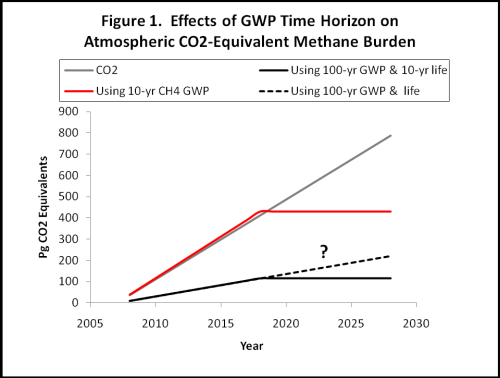Massive Natural Gas Storage Leak Alarms CA Residents, Climate Activists
December 7, 2015Video Makes Visible CA’s Unseen Natural Gas Disaster
December 31, 2015Below is a very important letter regarding the potentially severe mistake of conflating all greenhouse gases to CO2 equivalents using a 100 year time period in the current UNFCCC emissions reporting system. Methane (the major short lived greenhouse gas) expends its climate warming impact over a much shorter period of roughly ten years. Using a 100 year period, (that that may be appropriate for CO2), causes the reporting system to heavily discount the atmospheric warming effects from methane. If we further expand reliance on natural gas (which is 90% or more methane), the warming caused by increased methane emissions may overwhelm the CO2 – focused system, giving a false sense of security that will only come to light when it is too late and we are well beyond the atmospheric tipping point. Modifications to upgrade the UNFCCC reporting system to better reflect the effects of methane emissions is urgently needed.
DCS supported the writing of this letter, but the science is mainly from Bryce Payne, PhD, along with some of the other signers. Any scientist who wants to be added to the letter, please email DCS at dcs@damascuscitizens.org.
Download the full letter as a pdf.
TO: President Obama, Secretary of State Kerry and Special Envoy to COP21 of the UNFCCC Stern
EXECUTIVE SUMMARY
The UNFCCC 21 Conference of the Parties is underway in Paris. Unfortunately current UNFCCC conventions are based on flawed application of scientific information, which results in misleading estimates of effective levels of greenhouse gas emissions. This communication presents a brief explanation of the flaws and resulting errors by examining data presented primarily by the Fifth Assessment Report (2013) of the International Panel on Climate Change.
The current convention on greenhouse gas inventories requires use of outdated 100-year global warming potentials for greenhouse gases. This convention masks the global warming potential of methane. Use of more appropriate, up-to-date 10-year global warming potentials shows current methane emissions have greater short term global warming impacts than emissions of any other greenhouse gas, including carbon dioxide. Since human-caused emissions of methane are much easier to reduce than those of carbon dioxide, serious efforts to control methane emissions should be undertaken immediately. Current greenhouse gas inventory and reporting rules of the UNFCCC are causing the climate impacts of short-lived greenhouse gases such as methane to be functionally ignored. Ignoring the short term warming impacts of methane does not prevent or mitigate those impacts. If climate change mitigation efforts are to be effective, the short term impacts of potent, short-lived greenhouse gases, especially methane, must be considered. Doing so leads to the following conclusions:
- Short term climate impacts of anthropogenic methane emissions are five times greater than the current UNFCCC reporting rules suggest.
- Methane emissions estimates should be based on actual field measurement data. Unlike CO2 emissions that can be reasonably estimated from fossil fuel consumption data and inventories, methane emissions cannot.
- Greenhouse gas emissions inventories reported to the UNFCCC are misleading because they fail to accurately reflect the short-term impacts of methane emissions, and other potent, short-lived greenhouse gases.
- It is inappropriate to consider natural gas as a transition or bridge fuel with respect to climate change.
- Climate change benefits from reduction of methane emissions will accrue rapidly.
- Conversely, failure to control anthropogenic methane emissions will result in greater short-term climate impacts than the current UNFCCC emissions accounting system anticipates.
- Similarly, any increases in natural methane emissions will have rapid climate impacts.
- Atmospheric greenhouse gas concentrations will increase at current, or likely higher rates, until realistic, effective, sustained emissions reduction efforts begin. Specific efforts to control methane emissions should be part of a broad effort to reduce, preferably end, anthropogenic GHG emissions at the earliest possible date.




